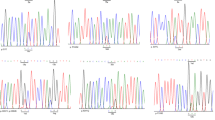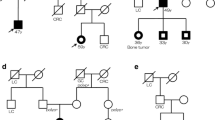Abstract
Mitochondrial DNA alterations have been widely reported in different human tumours, including colorectal carcinoma, but their mutational spectrum and pathogenic role in specific subsets of patients with polyposis syndromes have been poorly investigated. We compared the breadth of somatic variants across the mitochondrial genome of MUTYH-associated polyposis (MAP) patients with homogeneous groups of classical/attenuated familial adenomatous polyposis (FAP/AFAP) and sporadic cases. Overall, we screened 121 adenomas and seven adenocarcinomas and their corresponding germinal controls, for mitochondrial genes with a crucial role in oxidative phosphorylation and translation (MT-CO1, MT-CO2, MT-CO3, MT-TD, MT-TS1, MT-ATP6) as well as a hypervariable sequence (HV-II) within the control region displacement loop (D-loop), a marker of hypermutability and clonal expansion. The sequencing analysis revealed the presence of 17 variants, mostly causing non-synonymous changes in conserved amino acid residues, typically distributed in the MT-CO2 gene of MAP patients (P < 0.0001), who frequently carried the hot spot m.7763G>A variant. Accordingly, D-loop instability was also significantly associated with variants grouped inside the MT-CO2 gene (P = 0.0061). This is the first report showing a locus-specific distribution of mitochondrial DNA alterations in a subtype of colorectal tumourigenesis. In addition, our findings suggest that MT-CO2 variants, representing early molecular events in MAP tumorigenesis, might be a potential prognostic biomarker for the cancer-risk assessment of patients affected by this syndrome.
Key Messages
-
We compared the frequencies of mtDNA variants in MAP vs. FAP/AFAP/sporadic patients.
-
We found a gene-specific (MT-CO2) distribution of mtDNA variants in MAP cases.
-
Most mtDNA variants caused non-synonymous changes in conserved amino acid residues.
-
D-loop instability was significantly associated with variants grouped inside MT-CO2.
-
MT-CO2 variants might be a potential prognostic biomarker in MAP patients.


Similar content being viewed by others
References
Taylor RW, Turnbull DM (2005) Mitochondrial DNA mutations in human disease. Nat Rev Genet 6(5):389–402
Mercer TR, Neph S, Dinger ME, Crawford J, Smith MA, Shearwood AM, Haugen E, Bracken CP, Rackham O, Stamatoyannopoulos JA et al (2011) The human mitochondrial transcriptome. Cell 146(4):645–658
Sharma LK, Fang H, Liu J, Vartak R, Deng J, Bai Y (2011) Mitochondrial respiratory complex I dysfunction promotes tumorigenesis through ROS alteration and AKT activation. Hum Mol Genet 20(23):4605–4616
Woo DK, Green PD, Santos JH, D’Souza AD, Walther Z, Martin WD, Christian BE, Chandel NS, Shadel GS (2012) Mitochondrial genome instability and ROS enhance intestinal tumorigenesis in APC(Min/+) mice. Am J Pathol 180(1):24–31
Maillet A, Yadav S, Loo YL, Sachaphibulkij K (2013) Pervaiz S (2013) A novel Osmium-based compound targets the mitochondria and triggers ROS-dependent apoptosis in colon carcinoma. Cell Death Dis 6(4):e653
Ishikawa K, Takenaga K, Akimoto M, Koshikawa N, Yamaguchi A, Imanishi H, Nakada K, Honma Y, Hayashi J (2008) ROS-generating mitochondrial DNA mutations can regulate tumor cell metastasis. Science 320(5876):661–664
Park JS, Sharma LK, Li H, Xiang R, Holstein D, Wu J, Lechleiter J, Naylor SL, Deng JJ, Lu J et al (2009) A heteroplasmic, not homoplasmic, mitochondrial DNA mutation promotes tumorigenesis via alteration in reactive oxygen species generation and apoptosis. Hum Mol Genet 18(9):1578–1589
Li LH, Kang T, Chen L, Zhang W, Liao Y, Chen J, Shi Y (2014) Detection of mitochondrial DNA mutations by high-throughput sequencing in the blood of breast cancer patients. Int J Mol Med 33(1):77–82
Horan MP, Cooper DN (2014) The emergence of the mitochondrial genome as a partial regulator of nuclear function is providing new insights into the genetic mechanisms underlying age-related complex disease. Hum Genet 133(4):435–458
Tipirisetti NR, Govatati S, Pullari P, Malempati S, Thupurani MK, Perugu S, Guruvaiah P, Rao KL, Digumarti RR, Nallanchakravarthula V et al (2014) Mitochondrial control region alterations and breast cancer risk: a study in South Indian population. PLoS One 9(1):e85363
Máximo V, Soares P, Lima J, Cameselle-Teijeiro J, Sobrinho-Simões M (2002) Mitochondrial DNA somatic mutations (point mutations and large deletions) and mitochondrial DNA variants in human thyroid pathology: a study with emphasis on Hürthle cell tumors. Am J Pathol 160(5):1857–1865
Schwartz S Jr, Alazzouzi H, Perucho M (2006) Mutational dynamics in human tumors confirm the neutral intrinsic instability of the mitochondrial D-loop poly-cytidine repeat. Genes Chromosom Cancer 45(8):770–780
Greaves LC, Preston SL, Tadrous PJ, Taylor RW, Barron MJ, Oukrif D, Leedham SJ, Deheragoda M, Sasieni P, Novelli MR et al (2006) Mitochondrial DNA mutations are established in human colonic stem cells, and mutated clones expand by crypt fission. Proc Natl Acad Sci U S A 103(3):714–719
Sui G, Zhou S, Wang J, Canto M, Lee EE, Eshleman JR, Montgomery EA, Sidransky D, Califano JA, Maitra A (2006) Mitochondrial DNA mutations in preneoplastic lesions of the gastrointestinal tract: a biomarker for the early detection of cancer. Mol Cancer 5:73
Kassem AM, El-Guendy N, Tantawy M, Abdelhady H, El-Ghor A, Abdel Wahab AH (2011) Mutational hotspots in the mitochondrial D-loop region of cancerous and precancerous colorectal lesions in Egyptian patients. DNA Cell Biol 30(11):899–906
Abu-Amero KK, Alzahrani AS, Zou M, Shi Y (2005) High frequency of somatic mitochondrial DNA mutations in human thyroid carcinomas and complex I respiratory defect in thyroid cancer cell lines. Oncogene 24(8):1455–1460
Mehrabi S, Akwe JA, Adams G Jr, Grizzle W, Yao X, Aikhionbare FO (2010) Analysis of mtDNA sequence variants in colorectal adenomatous polyps. Diagn Pathol 5:66
Xie Y, Yang H, Cunanan C, Okamoto K, Shibata D, Pan J, Barnes DE, Lindahl T, McIlhatton M, Fishel R et al (2004) Deficiencies in mouse Myh and Ogg1 result in tumor predisposition and G to T mutations in codon 12 of the K-ras oncogene in lung tumors. Cancer Res 64(9):3096–3102
Ruggieri V, Pin E, Russo MT, Barone F, Degan P, Sanchez M, Quaia M, Minoprio A, Turco E, Mazzei F et al (2013) Loss of MUTYH function in human cells leads to accumulation of oxidative damage and genetic instability. Oncogene 32(38):4500–4508
Sakamoto K, Tominaga Y, Yamauchi K, Nakatsu Y, Sakumi K, Yoshiyama K, Egashira A, Kura S, Yao T, Tsuneyoshi M et al (2007) MUTYH-null mice are susceptible to spontaneous and oxidative stress induced intestinal tumorigenesis. Cancer Res 67(14):6599–6604
Oka S, Ohno M, Tsuchimoto D, Sakumi K, Furuichi M, Nakabeppu Y (2008) Two distinct pathways of cell death triggered by oxidative damage to nuclear and mitochondrial DNAs. EMBO J 27(2):421–432
Oka S, Leon J, Tsuchimoto D, Sakumi K, Nakabeppu Y (2014) MUTYH, an adenine DNA glycosylase, mediates p53 tumor suppression via PARP-dependent cell death. Oncogenesis 3(10):e121
Ohtsubo T, Nishioka K, Imaiso Y, Iwai S, Shimokawa H, Oda H, Fujiwara T, Nakabeppu Y (2000) Identification of human MutY homolog (hMYH) as a repair enzyme for 2-hydroxyadenine inDNA and detection of multiple forms of hMYH located in nuclei and mitochondria. Nucleic Acids Res 28(6):1355–1364
Out AA, Tops CM, Nielsen M, Weiss MM, van Minderhout IJ, Fokkema IF, Buisine MP, Claes K, Colas C, Fodde R et al (2010) Leiden open variation database of the MUTYH gene. Hum Mutat 31(11):1205–1215
Su LK, Barnes CJ, Yao W, Qi Y, Lynch PM, Steinbach G (2000) Inactivation of germline mutant APC alleles by attenuated somatic mutations: a molecular genetic mechanism for attenuated familial adenomatous polyposis. Am J Hum Genet 67(3):582–590
Nieuwenhuis MH, Vogt S, Jones N, Nielsen M, Hes FJ, Sampson JR, Aretz S, Vasen HF (2012) Evidence for accelerated colorectal adenoma-carcinoma progression in MUTYH-associated polyposis? Gut 61(5):734–738
Jones S, Lambert S, Williams GT, Best JM, Sampson JR, Cheadle JP (2004) Increased frequency of the k-ras G12C mutation in MYH polyposis colorectal adenomas. Br J Cancer 90(8):1591–1593
Venesio T, Balsamo A, Errichiello E, Ranzani GN, Risio M (2013) Oxidative DNA damage drives carcinogenesis in MUTYH-associated-polyposis by specific mutations of mitochondrial and MAPK genes. Mod Pathol 26(10):1371–1381
Wallace DC, Chalkia D (2013) Mitochondrial DNA genetics and the heteroplasmy conundrum in evolution and disease. Cold Spring Harb Perspect Biol 5(11):a021220
Kamiya H, Ueda T, Ohgi T, Matsukage A, Kasai H (1995) Misincorporation of dAMP opposite 2-hydroxyadenine, an oxidative form of adenine. Nucleic Acids Res 23(5):761–766
Kino K, Sugiyama H (2001) Possible cause of G•C→C•G transversion mutation by guanine oxidation product, imidazolone. Chem Biol 8(4):369–378
Legras A, Lièvre A, Bonaiti-Pellié C, Cottet V, Pariente A, Nalet B, Lafon J, Faivre J, Bonithon-Kopp C, Goasguen N et al (2008) Mitochondrial D310 mutations in colorectal adenomas: an early but not causative genetic event during colorectal carcinogenesis. Int J Cancer 122(10):2242–2248
Lott MT, Leipzig JN, Derbeneva O, Xie HM, Chalkia D, Sarmady M, Procaccio V, Wallace DC (2013) MtDNA variation and analysis using MITOMAP and MITOMASTER. Curr Protoc Bioinformatics 1(123):1.23.1–1.23.26
Stafford P, Chen-Quin EB (2010) The pattern of natural selection in somatic cancer mutations of human mtDNA. J Hum Genet 55(9):605–612
Kimchi-Sarfaty C, Oh JM, Kim IW, Sauna ZE, Calcagno AM, Ambudkar SV, Gottesman MM (2007) A “silent” polymorphism in the MDR1 gene changes substrate specificity. Science 315(5811):525–528
Mandal SM, Hegde ML, Chatterjee A, Hegde PM, Szczesny B, Banerjee D, Boldogh I, Gao R, Falkenberg M, Gustafsson CM et al (2012) Role of human DNA glycosylase Nei-like 2 (NEIL2) and single strand break repair protein polynucleotide kinase 3′-phosphatase in maintenance of mitochondrial genome. J Biol Chem 287(4):2819–2829
Halsne R, Esbensen Y, Wang W, Scheffler K, Suganthan R, Bjørås M, Eide L (2012) Lack of the DNA glycosylases MYH and OGG1 in the cancer prone double mutant mouse does not increase mitochondrial DNA mutagenesis. DNA Repair (Amst) 11(3):278–285
Itsara LS, Kennedy SR, Fox EJ, Yu S, Hewitt JJ, Sanchez-Contreras M, Cardozo-Pelaez F, Pallanck LJ (2014) Oxidative stress is not a major contributor to somatic mitochondrial DNA mutations. PLoS Genet 10(2):e1003974
Theodoratou E, Din FV, Farrington SM, Cetnarskyj R, Barnetson RA, Porteous ME, Dunlop MG, Campbell H, Tenesa A (2010) Association between common mtDNA variants and all-cause or colorectal cancer mortality. Carcinogenesis 31(2):296–301
Graziewicz MA, Day BJ, Copeland WC (2002) The mitochondrial DNA polymerase as a target of oxidative damage. Nucleic Acids Res 30(13):2817–2824
Lee HC, Yin PH, Lin JC, Wu CC, Chen CY, Wu CW, Chi CW, Tam TN, Wei YH (2005) Mitochondrial genome instability and mtDNA depletion in human cancers. Ann N Y Acad Sci 1042:109–122
Kloss-Brandstätter A, Schäfer G, Erhart G, Hüttenhofer A, Coassin S, Seifarth C, Summerer M, Bektic J, Klocker H, Kronenberg F (2010) Somatic mutations throughout the entire mitochondrial genome are associated with elevated PSA levels in prostate cancer patients. Am J Hum Genet 87(6):802–812
Bragoszewski P, Gornicka A, Sztolsztener ME, Chacinska A (2013) The ubiquitin-proteasome system regulates mitochondrial intermembrane space proteins. Mol Cell Biol 33(11):2136–2148
Chae S, Ahn BY, Byun K, Cho YM, Yu MH, Lee B, Hwang D, Park KS (2013) A systems approach for decoding mitochondrial retrograde signaling pathways. Sci Signal 6(264):rs4
Kaipparettu BA, Ma Y, Park JH, Lee TL, Zhang Y, Yotnda P, Creighton CJ, Chan WY, Wong LJ (2013) Crosstalk from non-cancerous mitochondria can inhibit tumor properties of metastatic cells by suppressing oncogenic pathways. PLoS One 8(5):e61747
Formentini L, Sánchez-Aragó M, Sánchez-Cenizo L, Cuezva JM (2012) The mitochondrial ATPase inhibitory factor 1 triggers a ROS-mediated retrograde prosurvival and proliferative response. Mol Cell 45(6):731–734
Kang KA, Zhang R, Kim GY, Bae SC, Hyun JW (2012) Epigenetic changes induced by oxidative stress in colorectal cancer cells: methylation of tumor suppressor RUNX3. Tumour Biol 33(2):403–412
Grzybowska-Szatkowska L, Slaska B (2012) Polymorphisms in genes encoding mt-tRNA in female breast cancer in Poland. Mitochondrial DNA 23(2):106–111
Guney AI, Ergec DS, Tavukcu HH, Koc G, Kirac D, Ulucan K, Javadova D, Turkeri L (2012) Detection of mitochondrial DNA mutations in nonmuscle invasive bladder cancer. Genet Test Mol Biomarkers 16(7):672–678
Ghaffarpour M, Mahdian R, Fereidooni F, Kamalidehghan B, Moazami N, Houshmand M (2014) The mitochondrial ATPase6 gene is more susceptible to mutation than the ATPase8 gene in breast cancer patients. Cancer Cell Int 14(1):21
Acknowledgments
This study was partly supported by “Associazione Italiana per la Ricerca sul Cancro” (AIRC).
Conflict of interest
All authors disclose any potential conflicts that are relevant to the manuscript.
Author information
Authors and Affiliations
Corresponding author
Rights and permissions
About this article
Cite this article
Errichiello, E., Balsamo, A., Cerni, M. et al. Mitochondrial variants in MT-CO2 and D-loop instability are involved in MUTYH-associated polyposis. J Mol Med 93, 1271–1281 (2015). https://doi.org/10.1007/s00109-015-1312-0
Received:
Revised:
Accepted:
Published:
Issue Date:
DOI: https://doi.org/10.1007/s00109-015-1312-0




